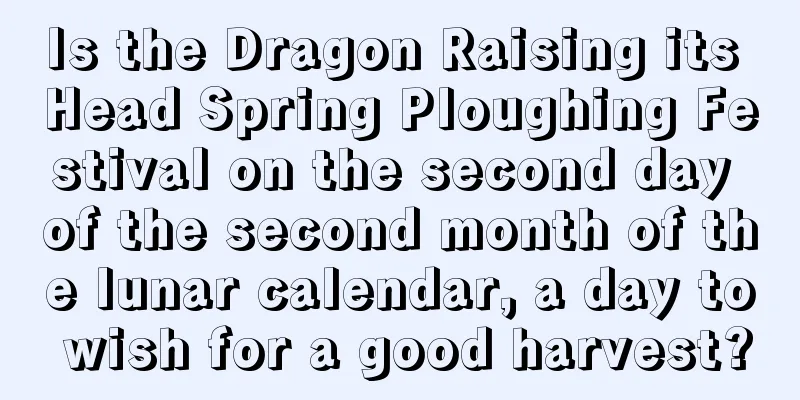Is the Dragon Raising its Head Spring Ploughing Festival on the second day of the second month of the lunar calendar, a day to wish for a good harvest?

Dragon Raising its Head is a traditional folk festival, also known as - Spring Ploughing Festival, Agricultural Festival, Spring Dragon Festival; Dragon Raising its Head Spring Ploughing Festival is on the second day of the second month of the lunar calendar, is it to wish for a good harvest? The calendars commonly used in China are the solar calendar and the lunar calendar, also known as the Gregorian calendar and the lunar calendar. The Gregorian calendar and the lunar calendar can be converted into each other. For details on the special content of February of the lunar calendar in 2020, please visit Mr. Shui Mo’s website!Is the Dragon Raising its Head Spring Ploughing Festival on the second day of the second month of the lunar calendar?】Dragon Raising its Head falls on the second day of the second month of the lunar calendar every year. Legend has it that this is the day when the dragon raises its head. It is a traditional festival in both urban and rural China.】Celebrate the "Dragon Head Festival" to show respect to the dragon and pray for rain, asking God to bless a good harvest. 】February 2 is said to be the birthday of King Yao. (1) In the south, such as the Hakka area, it is the birthday of the God of Land, called "Tudi Dan", to wish the God of Land a happy birthday. (2) In some places, there is a custom of holding a "land god meeting": every family collects money to celebrate the birthday of the land god, goes to the land god temple to burn incense and offer sacrifices, beats gongs and drums, and sets off firecrackers; (3) At the same time, people in northern China also have the custom of eating pig heads and getting a haircut (cutting the "dragon head") during festivals. ——The Dragon Head-raising Spring Ploughing Festival is the second day of the second lunar month ] The first day of the second lunar month is Zhonghe Festival, the birthday of the sun February 2, Spring Dragon Festival (Touya), also known as Dragon Raising its Head, Green Dragon Festival, the birthday of Jigong Bodhisattva in Buddhism . February 3, the birthday of Emperor Wenchang in mythology. February 12, Flower Festival (some say February 15), also known as Flower God Festival, the birthday of all flowers, the birthday of the flower god (flowering period) February 15th is the birthday of the Lady of the Nine Heavens in Taoism, and the birthday of the Supreme Lord Lao and the King of Yue in Taoism. February 19th is the birthday of the Avalokitesvara in Buddhism. February 21st is the birthday of the Samantabhadra in Buddhism. Wishing for a good harvest?February 2nd: represents a good harvest and a bumper crop, reflecting people’s expectations for a good harvest and their thirst for food, hoping to have enough food and clothing and a happy life.According to folklore, the second day of the second month in the lunar calendar is the day when the dragon, which is in charge of clouds and rain in the sky, raises its head. After that, the rainfall will gradually increase, indicating that there will be a good harvest this year and a good harvest. 《1》After the second month of the lunar calendar, the "Rain Water" solar term arrives, the winter's dry spell ends, and rainfall will gradually increase. 《2》In the old days, people would worship the millstone on this morning. Legend has it that the millstone is the incarnation of the Azure Dragon. 《3》Some people even prop up the roller to represent "dragon raising its head" to show dignity and bring good luck. Eating dragon food: This represents people’s good wishes for the dragon’s blessing. (1) Eating spring rolls is called “eating dragon scales”, eating noodles is called “eating dragon whiskers”, eating wontons is called “eating dragon eyes”, eating dumplings is called “eating dragon ears”, cooking noodles and wontons together is called “dragon pearls”, and eating scallion pancakes is called “tearing dragon skin”. (2) In some places, there is also the custom of eating "dragon eyes", "dragon whiskers", "dragon tongues", "dragon ears", "dragon skins", "dragon seeds", "dragon eggs", as well as eating spring rolls and pig heads. (3) All symbols and meanings are related to the dragon, which reflects people’s strong desire to pray for the dragon’s blessing. |
<<: Is it a good idea to open a new store or company on February 24, 2020, the Year of the Rat?
Recommend
Is the Grain Full Festival on May 21, 2019 a suitable day for funerals? Is it auspicious to hold a funeral on Grain Full Festival?
Introduction: Funeral is an important event, so an...
Analysis of the fate of a baby girl born on March 29th of the lunar calendar in 2019!
Is it good for a baby girl born on March 29th of t...
Is it a good idea to pick up the car on the ninth day of the seventh lunar month in 2018?
In the seventh month of the lunar calendar, there...
How about the 22nd day of the third lunar month in 2022? Can I go to propose marriage?
The third month of the lunar calendar is tradition...
Is it good for people born in Jingzhe to be born in the year of the tiger? Which month is the best to be born in?
Which month is best for people born in the Year of...
Can construction start on July 18th of the lunar calendar in 2022? Is it an auspicious day?
The seventh month in the lunar calendar is the mon...
Is September 8, 2019, the White Dew Festival a good day? Is the White Dew Festival a suitable day for moving the company?
Introduction: Bailu is one of the 24 solar terms, ...
Is March 12th of the lunar calendar in 2021 auspicious? Can I have a caesarean section?
March is also called Chenyue, Jichun, Peachyue, To...
Is it a good idea for our company to open its new store on the 15th day of the 11th lunar month in 2017?
In the eleventh month of the lunar calendar, whet...
Is the second day of the eleventh lunar month in 2019 suitable for opening the market and opening positions? Feng Shui for opening a business
The first day of a new store opening or a company ...
What is the fate of a boy born on the 26th day of the seventh lunar month in 2018?
There are no coincidences in this world, only inev...
What are the taboos for moving in the Beginning of Autumn in 2020? Does autumn start from the Beginning of Autumn?
Introduction: It is generally necessary to choose ...
Is March 14th of the lunar calendar in 2018 an auspicious day?
Introduction: March is full of warm atmosphere, an...
Is it good for a baby girl born on Christmas Day 2019? Is it good for a baby girl born on Christmas Day to have the wood element?
Introduction: The names of people born on Christma...
Is August 23rd of the lunar calendar 2019 an auspicious day for a haircut?
Is the 23rd day of the eighth lunar month in 2019 ...









